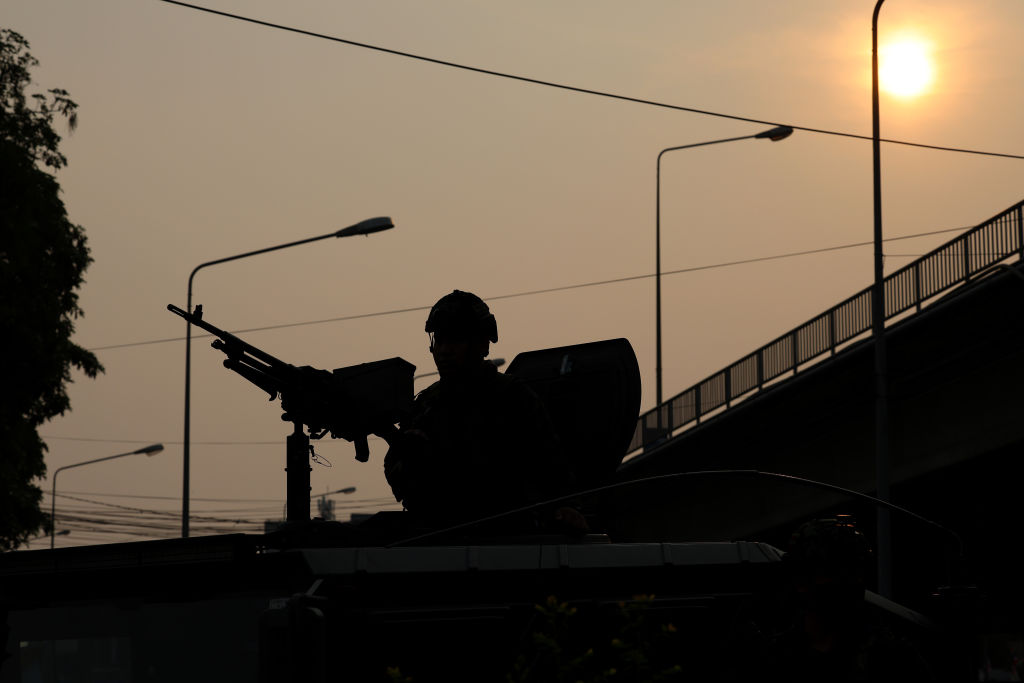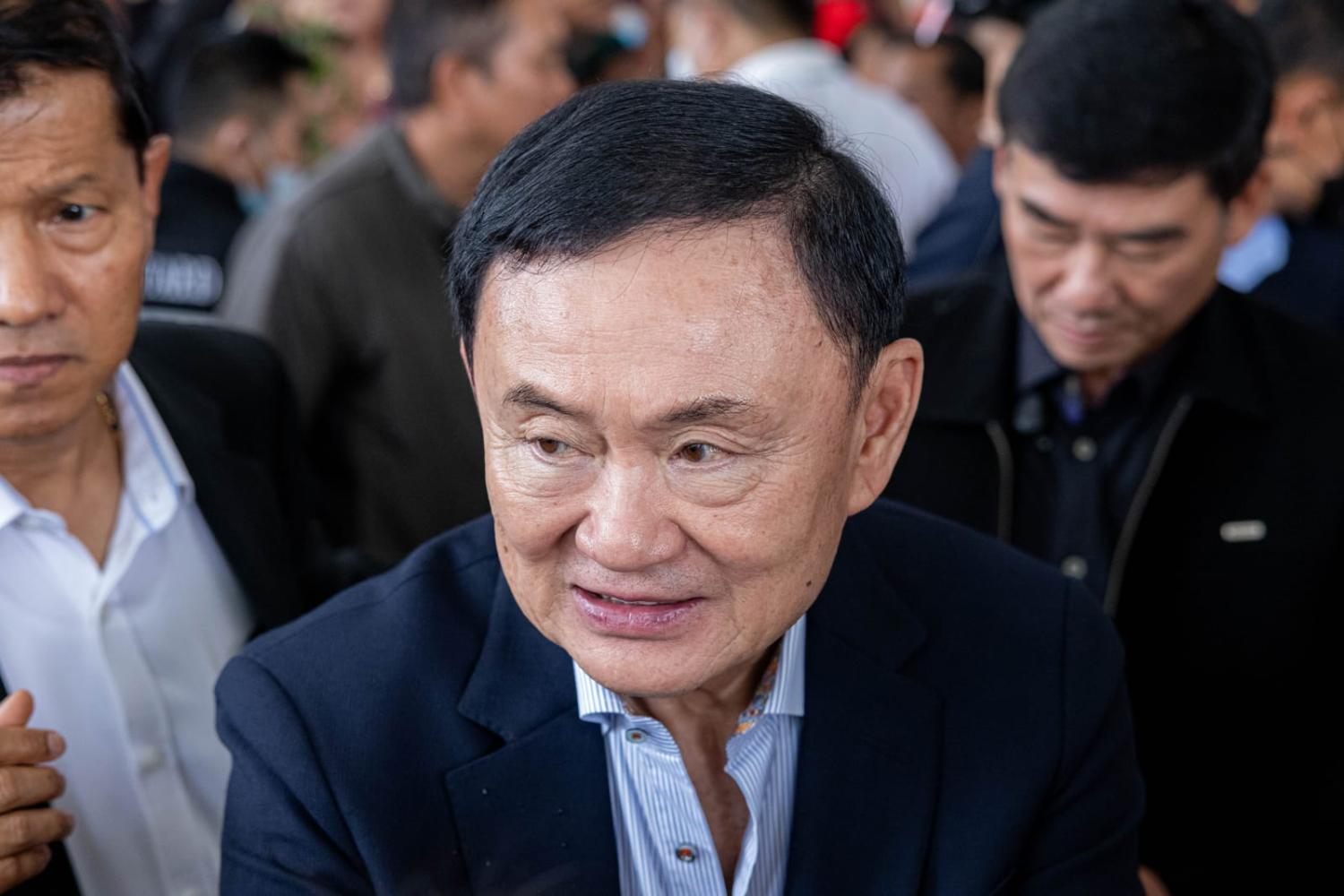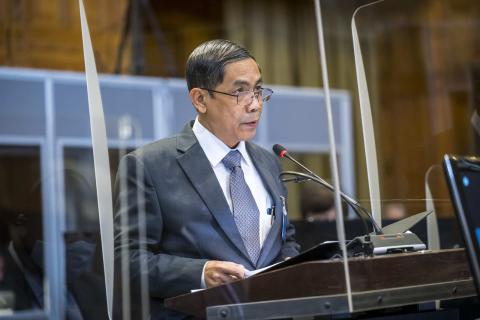Former Thai prime minister Thaksin Shinawatra has presented himself as a possible mediator of Myanmar’s civil war. But Thaksin is likely motivated by his own political and financial interests. His past personal ties to Myanmar’s military leader could hamstring any claims to be an honest broker.
On 6 May, a Myanmar media outlet – Salween Press – said Thaksin met representatives of some Myanmar ethnic armed groups and the National Unity Government (NUG). Thaksin had only returned to Thailand in August last year from a long self-imposed exile, and had been held in a police hospital until February.
Some of his meetings were confirmed by Thailand’s new foreign minister, Maris Sangiampongsa. The government said that it is not involved. But nor will it intervene.
Thaksin is widely held to the real leader of the ruling Pheu Thai Party, headed by his daughter Paetongtarn. She is but the latest family member to lead a Thaksin party, following in the footsteps of her aunt Yingluck, uncle Somchai, and Thaksin himself. Moreover, the Foreign Minister is close to Thaksin, and would not upset his patron.
Thaksin’s gambit in Myanmar is not a surprise. He has form for similar interventions, possibly to raise his domestic profile in Thailand by showcasing his supposed statesman qualities.
- In 2009, while Thaksin was a fugitive from Thai courts, Cambodian strongman Hun Sen appointed him as his country’s economic advisor.
- Later that year, Thaksin’s family said Sri Lanka’s government was also planning to make him an economic advisor – a claim Colombo denied.
- In 2012, he met in Malaysia with representatives of southern Thailand insurgent groups, ahead of general consensus between his sister Yingluck’s administration and the chief insurgent group active in southern Thailand – the National Revolutionary Front (better known by its Malay-language acronym “BRN”).
But these actions produced little for the other parties. In 2010, Phnom Penh announced Thaksin had resigned as its economic advisor “because of personal difficulties in fulfilling his role completely”. Thaksin’s meetings with insurgent representatives represented nothing new: peace talks had been held intermittently for years. And they did not reduce violence, as data from the non-government organisation Deep South Watch shows: it only trended downward after the 2014 coup against Yingluck’s government.

Thaksin’s past actions also hamstring his ability to be seen as an honest broker.
- In 2004, after 78 ethnic Malay protesters suffocated to death in military custody (seven others were shot dead), Thaksin blamed the victims, saying they had been weak from fasting for the Muslim holy month of Ramadan. He refused to apologise or discipline officials responsible, and was cited at the time as saying, “I commend the anti-riot forces for adhering to my instructions.” He said the previous year he “was only implementing hard-nosed measures to counter [insurgents’] use of violence.”
- Likewise, Myanmar’s ethnic groups and opposition National Union Government are likely to view Thaksin with a jaded eye. They would know Thaksin is friendly with their chief enemy and junta leader Min Aung Hlaing, and that he was on good terms with other senior Myanmar leaders. In 2011, Thaksin met with then Myanmar president Thein Sein and former president Than Shwe.
- Myanmar opposition figures would also know of Thaksin’s financial dealings with the military. Thaksin pressured Thailand’s foreign ministry to approve a four billion baht (US$ 139 million) loan to Myanmar in 2014, through which Thaksin’s company leased a satellite service to a business owned by the son of Myanmar’s former prime minister and spy chief, General Khin Nyunt. And junta strongman Min Aung Hlaing reportedly gave Thaksin land in Yangon.
- Thaksin also set in motion Thailand’s abortive Dawei port project in Myanmar. To connect the port to Thailand, a Thai company – Italthai (owned by one of Thaksin’s buddies) – built a road through the territory of one of Myanmar’s ethnic armed groups, the Karen Nation Union (KNU), pushing aside numerous KNU settlements. Italthai employed as its director of special projects a former brigadier-general of Myanmar’s military intelligence.
It’s not always possible to know where Thaksin’s political goals end and his financial goals start. In a 2009 interview with the French newspaper Figaro, after Thaksin’s supporters protested following a legal move to seize US$2 billion of his wealth, he said his aims were, “Democracy, symbol of liberty, equality and fraternity, like you, the French!”, before adding, “It is also necessary that I recover my frozen assets.”
This may also be the case in Myanmar, where Thaksin reportedly has had business interests. According to The Irrawaddy – an online news site founded by exiled Myanmar journalists – Thaksin also had property in the cities of Dawei and Myanmo, as well as oil- and gas- interests in the country.
It is unlikely Thaksin’s latest gambit will pay peace dividends for Myanmar. Indeed, given his personal ties to Myanmar’s coup leaders and likely financial interests, his intervention could detract – or at least distract – from official Thai efforts to resolve the civil war there.
Moreover, it could lead to increased focus on Thai economic ties with the powers-that-be in Myanmar. This, in turn, could provoke some potentially awkward questions, particularly by those progressive Thais keen to see a more rights-based international outlook in the country’s foreign policy.

